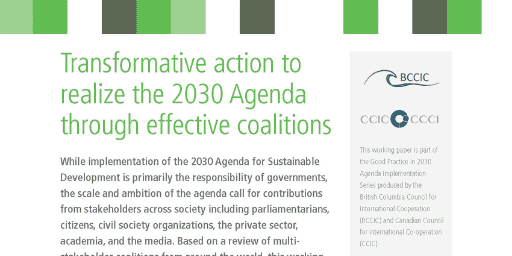The British Columbia Council for International Cooperation (BCCIC) and the Canadian Council for International Cooperation (CCIC), in partnership with Action for Sustainable Development and Forus, today announced the release of a new working paper, Transformative Action to Realize the 2030 Agenda Through Effective Coalitions.
While implementation of the 2030 Agenda for Sustainable Development is primarily the responsibility of governments, the scale and ambition of the agenda calls for contributions from across society. Based on a review of multi-stakeholder coalitions from around the world, this working paper provides a series of good practices and evidence-informed recommendations that can be used to strengthen coalitions that accelerate and transform action for sustainable development.
Dr. Zosa De Sas Kropiwnicki-Gruber, the Senior Policy Analyst and Gender Specialist at BCCIC explained that the working paper is designed to support learning through practical recommendations and key messages supported by concrete examples and insightful lessons-learnt from coalitions on four continents: “When analyzing the partnerships that diverse actors are forging in and through SDG coalitions, there is a great deal that we can learn about how to work together effectively, inclusively and innovatively towards the common goal of a more just, equitable and sustainable world.”
FIND THE FULL INTERVIEW WITH DR. ZOSA DE SAS KROPIWNICKI-GRUBER HERE
Shannon Kindornay, Director of Research, Policy and Practice at CCIC, explains that “this research is really trying to help inform how these coalitions function so they can put their best foot forward to be inclusive, to be equitable and to really ensure that the voices of those being left behind are being heard.”
FIND THE FULL INTERVIEW WITH SHANNON KINDORNAY HERE
Deirdre de Burca, Advocacy Coordinator at Forus describes the layout and functionality of the report as “a handbook for people and organizations that are interested in partnering in new and interesting ways.” De Burca adds that “It doesn’t matter if you’re a government, if you work for a private sector company, if you’re a member of a trade union, if you’re a member non-governmental organization – no matter what background you’re from or what sector you work in, this document has something for you.”
FIND THE FULL INTERVIEW WITH DEIRDRE DE BURCA HERE
“National coalitions like those that we’ve looked at through the report can provide a really strong infrastructure to bring together voices, and be a strong united voice, in terms of advocacy, campaigning, and the change we need to see in the coming years,” says Oli Henman, Coordinator at Action for Sustainable Development. What ultimately excites Henman about this report, and about the work of coalitions as a whole, is that the sustainable development sector is moving away from a hierarchical structure to one that is horizontal and that makes room for more voices.
FIND THE FULL INTERVIEW WITH OLI HENMAN HERE
Although any reader looking to develop partnerships towards the SDGs would benefit from reading this document, the intended audiences are civil society organizations, coalitions themselves and governments. This new working paper, released today, offers concrete examples of transformative coalitions in action and was produced in collaboration with BCCIC, CCIC, Action for Sustainable Development and Forus.

